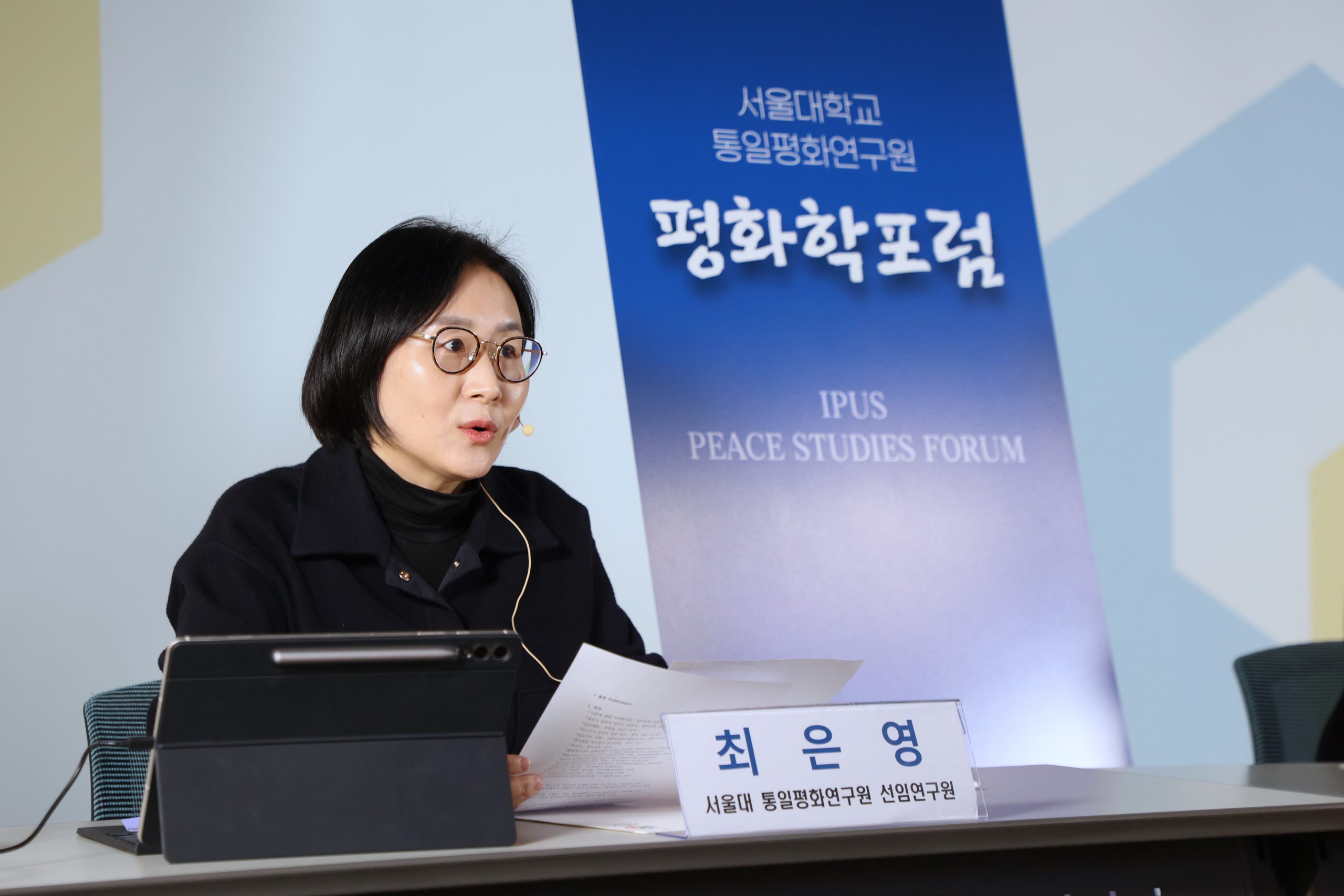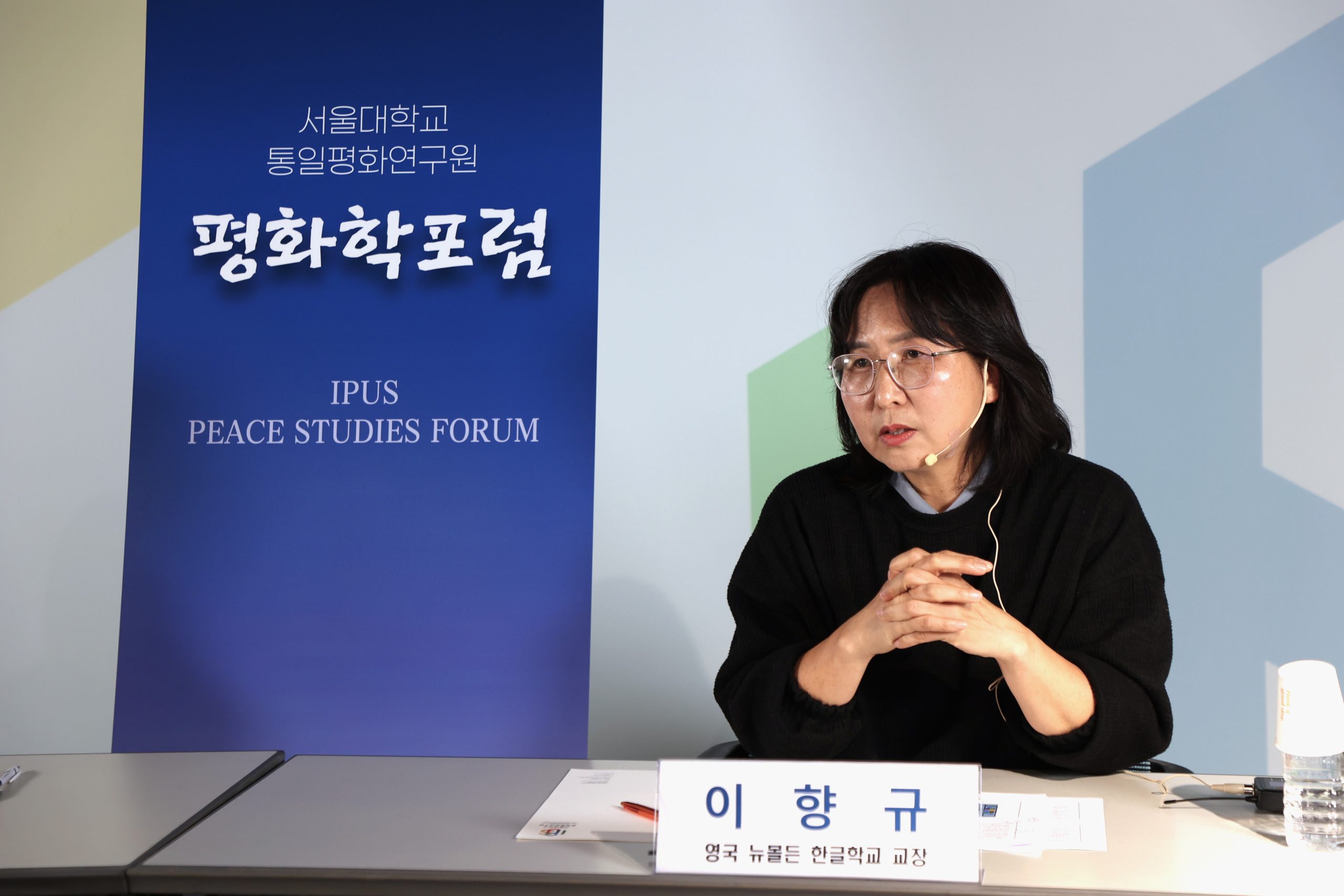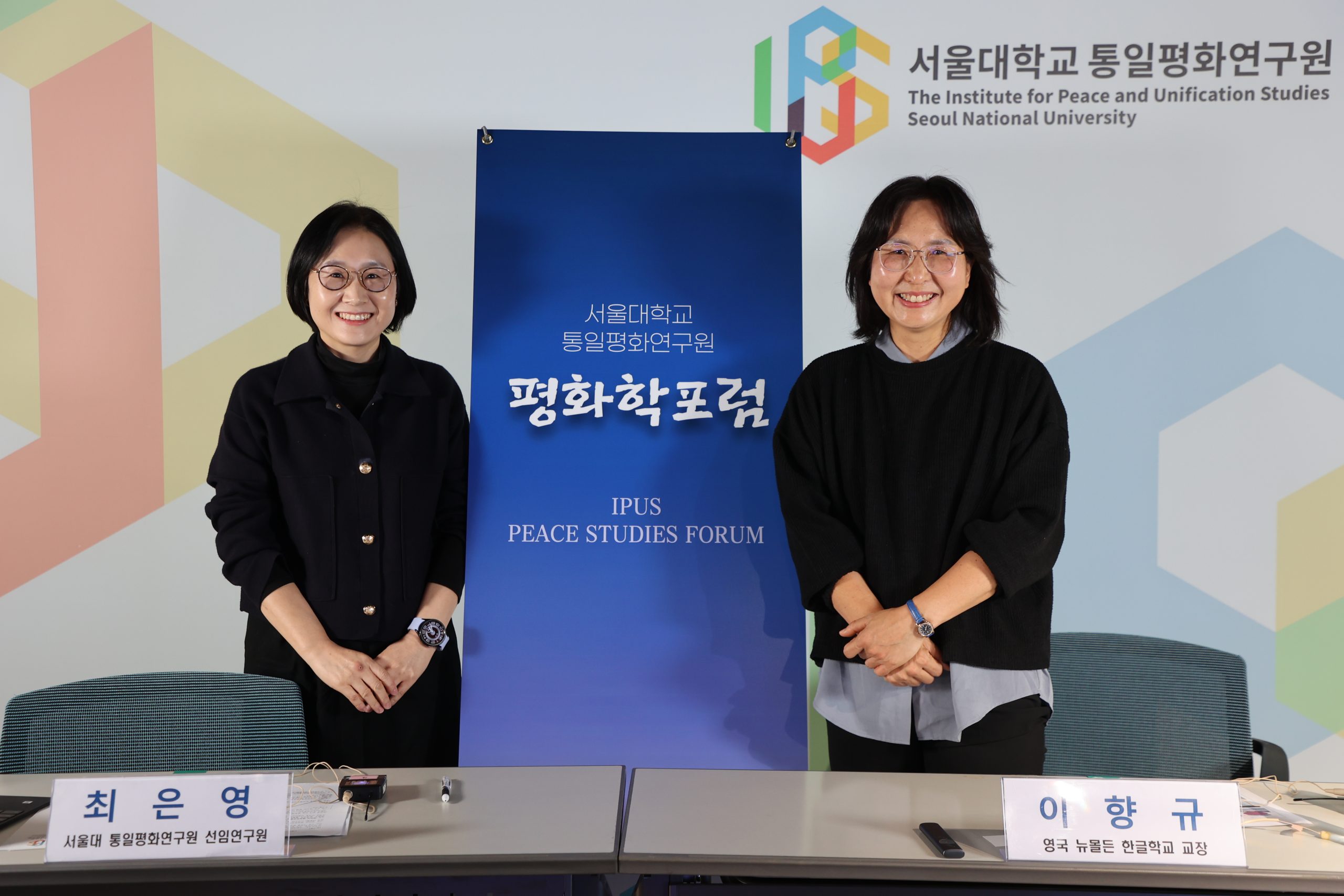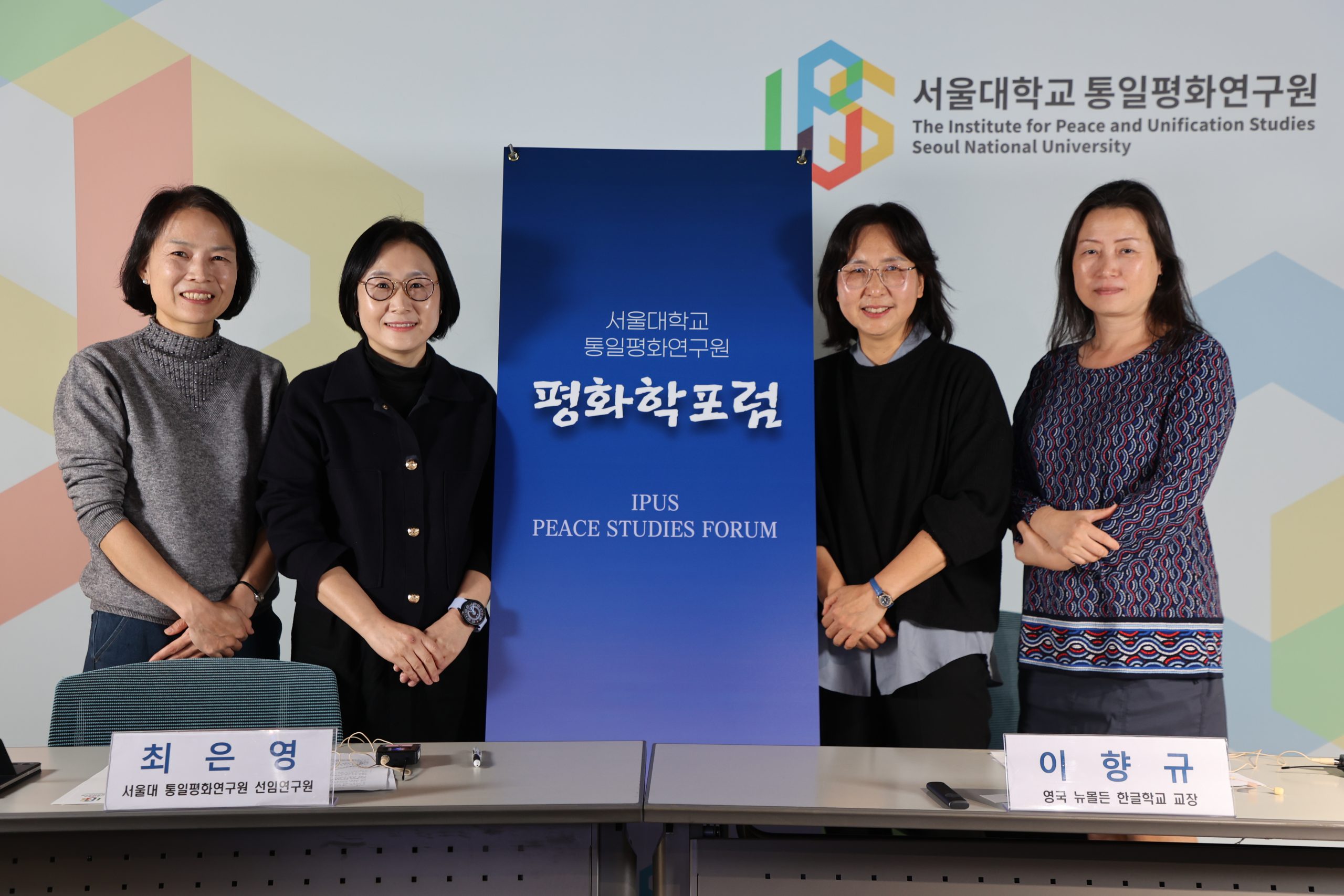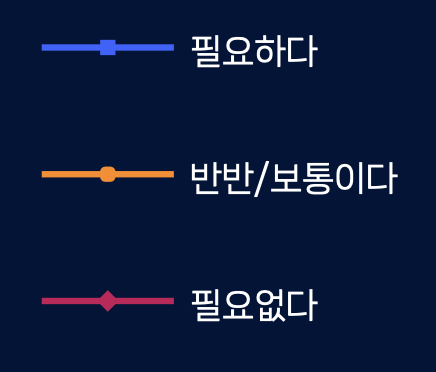[26th Peace Studies Forum] Post-Division Experiments and Coexistence Beyond the Korean Peninsula: A Case Study of the New Malden Korean School in the UK
- Date: Thursday, October 24, 2024, 17:00-18:30
- Venue: Online Video Conference(ZOOM)
- Presenter: Lee, Hyang Kue (President, New Malden Korean School in the UK)
- Chair: Choi, Eunyoung Christina (Senior Fellow, IPUS at SNU)
- Topic: Post-Division Experiments and Coexistence Beyond the Korean Peninsula: A Case Study of the New Malden Korean School in the UK
The Institute for Peace and Unification Studies at Seoul National University (IPUS at SNU) held the 26th Peace Studies Forum on Thursday, October 24, 2024, under the overarching theme of ‘Peaceful Coexistence: Post-Division and Multiculturalism.’ The forum featured a discussion led by Lee, President Hyang Kue from the New Malden Korean School in the UK under the main topic ‘Post-Division Experiments and Coexistence Beyond the Korean Peninsula: A Case Study of the New Malden Korean School in the UK.’ Choi, Eunyoung Christina, Senior Fellow of the Institute for Peace and Unification Studies at Seoul National University, chaired the forum, opening the event with welcoming remarks.
In this forum, Dr. Lee explained the uniqueness of the New Malden area and the significance of the “experiment of overcoming division” at the Korean school in New Malden and the lessons learned from it. First, Dr. Lee emphasized that although the New Malden area in England is known as “Little Korea” because of the North and South Koreans living together, “it is not a monolithic community due to different immigration histories, socioeconomic circumstances, and cultures,” and that the community of North Koreans is much more vulnerable. “The enactment of the North Korean Human Rights Act in the U.S. in 2004 and the North Korean Human Rights Act in the EU in 2006 spurred the exodus, which peaked between 2007 and 2008,” Dr. Lee said. “However, in 2008, the U.K. government began requiring South Korean fingerprints on North Korean refugee applications, and at one point, the refusal rate skyrocketed to 80.1 percent in 2009.” Dr. Lee then introduced a number of previous studies that examine “what makes them settle in Western societies and what makes them different from North Korean refugees in South Korea,” including a study by Lee and Lee (2014) that explains the relationship between North and South Korean residents in New Malden along three axes: “1) the third space of ‘Korean’ as a minority; 2) the fluid ‘economic interdependence’; and 3) the status of North Korean refugees as permanent residents.
“There are few places in the world where North and South Koreans live together, and because there is no continuous influx of North Korean refugees, it is actually a very temporary and exceptional space,” Dr. Lee explained. “It is also unique in that North and South Koreans can interact and communicate in everyday spaces, such as the streets of New Malden, schools, churches, and workplaces,” said Dr. Lee. ”For example, the Unification Kitchen, the Korean Senior Citizens Association, joint funerals, calligraphy groups, and joint attendance at events related to the Korean War are positive examples of how North and South Koreans appreciate the value of cultural elements and show mutual support in life difficulties and respect for personal matters.” On the other hand, “there are still elements of conflict,” Dr. Lee said, explaining that “the frequent gatherings of groups within the Korean diaspora and the political conflicts that result from them, the expression of latent ideological conflicts, and issues of pride in conflict situations show a picture of coexistence under tension.”
Dr. Lee went on to explain that this experience is also reflected in the process from the Hankyoree School in London to the New Malden Korean Language School. “The London Korean Hankyoreh School, which was launched at the initiative of North Korean defectors, has been struggling to operate due to the overlap with the nearby London Korean School, failing to register as an official Korean language school and lack of support,” Dr. Lee explained. ”In the second half of 2021, the school began to receive textbook support from the Korean Embassy, overhauled its curriculum, and increased the number of students, but for various reasons, the school became difficult to operate.” “In April 2021, Dr. Lee became the first South Korean to head the London Korean Hankyoreh School, vowing to ‘think about education, not politics,’” she said, “and the biggest question was ‘what should we teach?’” “As part of an experiment to overcome the divide, we organized a ‘Peace Day’ event in which we invited Korean War veterans in the UK to tell their stories,” Dr. Lee said, ‘and this was possible because the UK was a third space and a place where ’multiculturalism’ was familiar.” Recalling that despite these attempts, the school became increasingly unpopular due to conflicts of interest surrounding its operation, Dr. Lee explained, “I realized that individual conflicts between North and South Koreans could always be amplified into collective conflicts, and I began to think about ‘educational autonomy’ and ‘what to teach’ again.”
Based on these concerns, in June 2023, Dr. Lee founded the New Malden Korean School, emphasizing that she “focused on the common heritage of the Korean people, namely language, rather than the larger discourse of reunification or peace.” In other words, Dr. Lee “shifted the focus of education to ‘Korean language education, which is what a Korean language school should do,’ and especially utilized cultural elements such as poetry, traditional fairy tales, and nursery rhymes with beautiful songs to experience the beauty of the Korean language,” she explained. “We also formed a student council through direct voting so that everyone could share the experience of democracy,” said Dr. Lee, who emphasized that the value of the school is that adults from both North and South Korea ‘build’ a good school together. “The school should be a ‘space for everyday life,’ not an experiment or a project,” Dr. Lee said, emphasizing that ‘it is important to pursue a Korean-style curriculum that is free from the mechanical neutrality of ’teaching North and South Korean culture fairly,‘ but to make the school a ’quality contact space’ where members from different backgrounds can participate in school management.” “By focusing on the individual rather than the collective, we seek to pursue ‘organic union’ without mechanical allocation, and by exchanging daily life, culture, and habits, we encourage students to think in a larger community beyond North and South Korea,” Dr. Lee explained. “By doing so, we hope to create a virtuous cycle in which schools become ‘quality contact spaces’ and provide opportunities for growth not only for students, but also for teachers, parents, and community members,” she said, sharing his determination to ”think about better education through lessons learned from past efforts and setbacks.”


